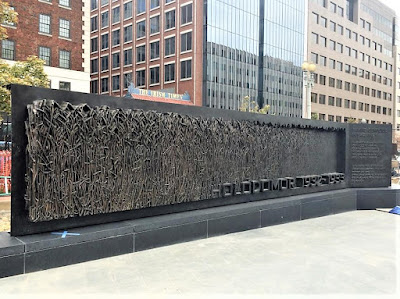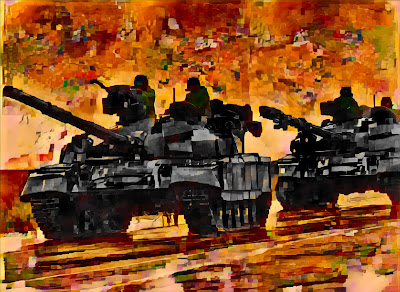In the early morning hours of February 24, 2022, Russia launched a massive invasion of Ukraine by land, sea, and air.
This is not really surprising; it has been brewing at least since Vladimir Putin annexed Crimea in 2014 and stirred up separatist movements in two of Ukraine's Eastern provinces. Eight years ago, Western media featured daily updates on Ukraine's vast protest movement against the heavy hand of Putin's hegemony in the region and his obsession with preventing Ukraine from deepening its ties with the rest of Europe. I posted about these events several times on this blog in February and March 2014.
In those days, there were widespread concerns in everyone’s minds about how far Putin's militarism would go. Much of the West soon became distracted from these concerns, but the Ukrainians continued to endure the intrusion of Russian power even as they struggled to solidify the realization of stable institutions and alliances as an independent nation-state.
Now, however, the crisis has become exponentially more acute. Russian armed forces are engaging in a brazenly open invasion of the whole of Ukraine, seizing sovereign territory, inflicting casualties, destroying infrastructure, and approaching the capital city of Kyiv.
All of this, according to Putin, is justified by the alleged security needs of the two separatist “republics” at the border of Eastern Ukraine, to which he granted “recognition” on Monday. Putin claims to be responding to Ukrainian attacks against them, without offering any evidence. It’s the classic pretext for naked aggression.
In fact, Putin has a list of grievances and accusations against the West, and insists that Ukraine itself has no right to exist as a sovereign nation. I read the entire text of the hour-long historical-cherry-picking speech he gave on Monday. It was crass, skewed, and incredibly condescending toward Ukrainian aspirations. Even worse, it was a virtual apologia for centralized dictatorship and a preposterous attempt to whitewash the filth of the Soviet past, at least with regard to Soviet centralism’s provision of strength and political stability.
Putin is not a Communist. But he seems to be an admirer of autocracy, in particular Russian autocracy. Listening to Putin's speech of February 21, one would think that Moscow’s overlordship was the only effective and viable political option for governing Eastern Slavic peoples. He blames Lenin and the early Bolsheviks for encouraging too much the nationalist movement in Ukraine in the early 20th century in order to secure Ukrainian support for the new regime of “Soviet Socialist Republics.” Then, after making vague references to the regrettable nature of Stalin’s terror tactics, he seems to imply that the end result of Stalinism was somehow beneficial in that it restored “unity” to the Soviet state (i.e. centralized totalitarian control to Moscow).
 |
For someone who claims to be appealing to the greater patriotic sense of Ukrainians, this was an outrageous lapse into historical forgetfulness. Joseph Stalin is not a name that inspires reverence or nostalgia among Ukrainians. How can any respectable world leader (much less the leader of Russia!) speak of Stalin with reference to Ukraine without mourning the appalling genocidal famine - the Holodomor - perpetrated by Stalin in 1929-33 that murdered millions of Ukrainians? Is it any surprise that Ukrainians don’t want to entrust themselves to the hegemony of a Moscow ruled by the likes of Vladimir Putin?
I don’t know what Putin was thinking; it would be easy here to just accuse him of being a rogue bent on humiliating and insulting the nation he was about to invade and conquer. The implications of such an accusation are so terrible, however, that I would prefer to assume that it only indicates the crass ignorance of a career KGB agent who - whatever his pretenses to historical erudition may be - thinks no further than his immediate objective requires. In any case, Putin decided that the only mistake of Stalin worth mentioning in his speech is that Stalin didn’t change the Soviet constitution to reflect that the “republics” were in reality nothing more than provinces of Moscow’s Great State. This left open the door for the re-emergence of “nationalist movements” in the 1980s and the eventual fragmentation of the Russian-controlled “Union.” According to Putin, this is the only reason why Ukraine exists as an independent nation. This, to say the least, is another insult against the Ukrainian people and their spirited and consistent efforts to affirm their unambiguously verifiable national identity and its deep roots in their history as a people.
Ukrainian perseverance seems to be a source of great frustration for Putin, who wants to exercise a stronger hand in this fertile and resource-rich country. He claims that he does not seek to restore the old centralized Soviet political union (or parts of it). What seems clear, however, is that he believes in some kind of “Greater Russia” that looks to Moscow as its political reference point (in the strong sense of the term).
By launching a massive military action, without provocation (or at least grossly disproportionate even for one who agrees with Putin’s goals and assessments), Putin only proves that the Ukrainians have been right to fear him, and to seek other security alliances (e.g. NATO) to protect them against his aggression. Whatever one thinks of NATO's relevance or practicality in the multilateral world of today, it was originally established to be a defensive alliance and it has remained true to this purpose. Is it surprising that nations surrounding Putin’s Russia have sought refuge in NATO - Poland, Latvia, Lithuania, Estonia? Stalin’s centralized State apparently decided that the latter three “belonged” under its power and made an effort to include Poland as well. Today these nations fear that Stalin’s post-communist, autocratic protégé may have similar plans for the “influence” of a new Greater Russia. In light of what’s happening in Ukraine right now, it is understandable if they feel that their fears are justified.
It might be argued that Ukraine is a “special case.” But while there are certainly profound and ancient fraternal bonds between Russians and Ukrainians, their long and complex history does not vindicate the always-inflated claims (old or new) of Muscovite imperialism. I have long studied the history of this part of the world and I have great love for both the Russian people and the Ukrainian people, as well as those who have mixed Russian and Ukrainian ancestry. I understand and appreciate their concerns about many destructive secularist Western cultural and social forces. But dictatorship and offensive war are also destructive forces. Domination is not brotherhood, and there is nothing new about Vladimir Putin’s dream of reviving some new form of the regional domination once enjoyed by the Soviet Union or the Russian Empire.
Certainly Putin’s theories and dreams do not constitute a justification for an invasion of Ukraine using damaging and lethal force, a violation of international law so flagrant that no other nation is willing to endorse it. The times we live in may be tumultuous and confusing, but the fundamental tenets of international law are still recognized. They still exist to restrain the gangs that roam the global village, and to protect the multitudes of innocent people therein.
What does Putin hope to accomplish? It’s hard to fathom the recklessness of actually launching an invasion of this magnitude. What he has done is in total opposition to building bonds and furthering closeness between Ukraine and Russia. It can only bring suffering to Ukrainians and Russians now and in the future, and the consequences of any further escalation would be catastrophic in ways we can scarcely imagine.
May God have mercy on the perpetrators and the victims of this war, and on the whole world. Holy Theotokos, Mother of God, Virgin of Kyiv, Virgin of Vladimir, Mother of Tenderness, protect all your children. Beg your Son to convert our hearts to Him.

